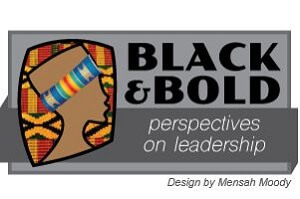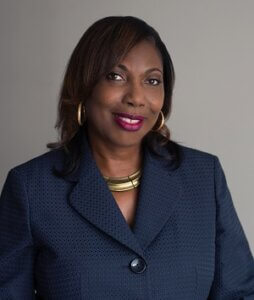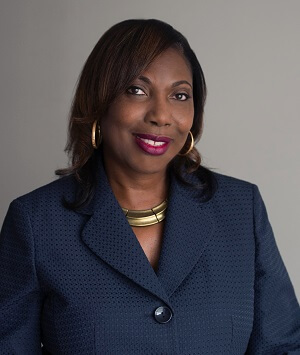An Interview with Wylecia Wiggs Harris, CEO, AHIMA

For more about the series, Black & Bold: Perspectives on Leadership, click here.
Wylecia Wiggs Harris, CEO, American Health Information Management Association (AHIMA)
Tell me about your current role?
Currently I serve as CEO of AHIMA, an organization that represents over 100,000 members and certificate holders dedicated to a world where trusted information transforms health and healthcare by connecting people, systems, and ideas. (Wylecia Wiggs Harris pictured at right.)
I do a variety of things as CEO. I spend time connecting with external and internal partners and stakeholders. Over the past eighteen months, I have spent time enhancing relationships inside and outside of the organization, along with working with the AHIMA board of directors to set a strategic vision. Turnarounds are difficult. Some days I’m the chief cheerleader encouraging staff. Other days, I’m the chief provocateur questioning why we have done it this way and why aren’t we open to doing things differently. Other days, I’m looking at data and reviewing financial statements. A lot of what I do relies on people, systems, and ideas: having the right systems in place, and right people to connect to ideas.
What are some of your career highlights?
Prior to AHIMA, I was CEO at the League of Women Voters of the United States (LWVUS) and the League of Women Voters Education Fund. I’ve held senior executive positions at the American Nurses Association, including as Chief Operating Officer, was executive director of the Center for American Nurses, and executive director of the Maryland-based Sister to Sister Foundation—a national organization supporting women’s health issues and heart disease education. I spent seventeen years in various roles at the American Heart Association. I have experience working with c3 (charity), c4 (civic engagement) and c6 (membership) organizations. I have either worked in or managed most functions within nonprofit organizations– such as communications, advocacy, marketing, membership, IT, finance, and research.
At the American Heart Association (AHA), early in my career I led efforts to help consolidate the state affiliates into regional hubs. As part of the work to consolidate the DC metro region, I secured one of the early regional sponsorships at the $100,000 level for Heart Walk. My work with the American Nurses Association afforded me the opportunity to work in conjunction with the CEO and board of directors to support a transformation of the organization. More recently, during my tenure at LWVUS, I laid out a path forward for that organization. Those experiences prepared me to lead AHIMA and in a short period of time to begin creating a different culture here and work with staff and the board to chart a new path. I define my career as a turnaround leader whether at the department level or national level. I focus on how to enhance an organization and leave it stronger than when I arrived.
If there was a headline for your leadership journey throughout your career, what would it be?
Being a turnaround leader is part of the headline. I sit in this seat because I said yes when others said no. I understood there would be peaks and valleys on this journey but never lost sight of where I wanted to go. I knew that I wanted to be the head of an organization, and it wasn’t a straight path here. There were often lateral moves, but I never lost sight of my ultimate goal.
Work in the social sector can be very personal and linked to one’s values. Can you think of a time when your values were in tension during your career and how you reconciled that tension or not?
I have been very fortunate to work in organizations where there is great alignment with my personal and professional values. This is because when considering an organization, I validate there is alignment between my personal values and those of the organization. Several weeks ago, an issue arose that represented a values challenge. I had to decide whether to stand behind my personal values or ignore the issue for expediency. While addressing the issue was difficult, I held firm to my beliefs.
Can you share an experience in the workplace where you have had to reclaim your time? What was the context? How did you navigate it? What was the outcome?
This is a hard question. Let me reframe it from the perspective of whether there was ever a time that I had to reclaim my reputation. From a personality standpoint, I am a quiet and reserved leader. As a result, people make assumptions about me that are not fair or accurate. I was in an environment in which I was working for someone with style A and I had style B; style A was more abrasive contributing to a lot of tension in the workplace. My reputation was tarnished by style A. People had interpreted my quiet and reserved manner as stuck up, not caring and enabling the style A leader. I had to launch a personal PR campaign to reclaim my reputation and yes, I made some mistakes. It’s always important to acknowledge and own those mistakes, so I laid out a plan to rectify them. I recall mapping out the plan to reclaim my reputation on a flipchart. I eventually left that organization and when staff found out I was leaving they were incredibly sad and asked me who was going to stand up for them now. My lesson to them was not to be so quick to judge their next leader.
What’s your approach to self-care? Are there any rituals you use to survive and thrive?
Staying physically, spiritually and emotional healthy. Prayer, devotion, Bible reading, and contemplation. I work out at least six times a week. I also have a long commute of three hours which gives me time to wind down and do mindless reading. I listen to music, pay attention to my body, and know when I need to take a mental health day.
We come from a resilient and strong lineage. How would you describe the type of ancestor you want to be and why?
I’d like to leave a legacy of gratitude making it clear that I was willing to help others and that I was open to continuous learning. I recognize the sacrifices made by strong resilient black women and it’s with gratitude that I honor their sacrifices. Those sacrifices allow me to sit in this seat today. I work hard to say yes when asked to mentor or be a champion for others.
What advice would you offer other Black women trying to develop or amplify their voice and become self-advocates?
Find your authentic voice and nurture it. Don’t allow anyone to silence your voice. Believe in yourself even when others doubt you. Be willing to invest in yourself to achieve your goals and help you to grow.
Develop the ability to listen effectively while blocking out noise that will tear you down. Don’t dwell on the distractions.
If you could change the social sector in a way that would benefit, lift up, or affirm Black women, what would that change be?
The social sector should be more open to the leadership of Black women and their own special unique voice and style versus the expectation that we replicate the leadership styles of other leaders. View our leadership as a gift and not intimidation. Accept that our inclusion in the sector actually strengthens the sector since we see the world through a different lens.


Comment section